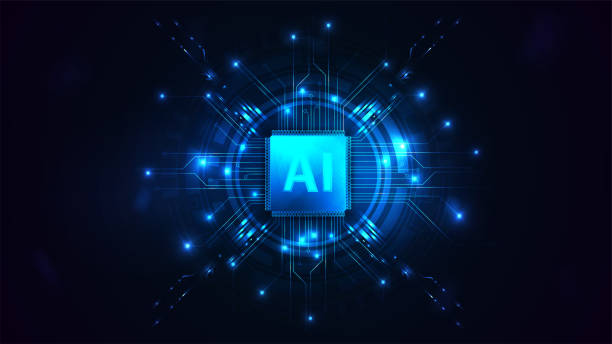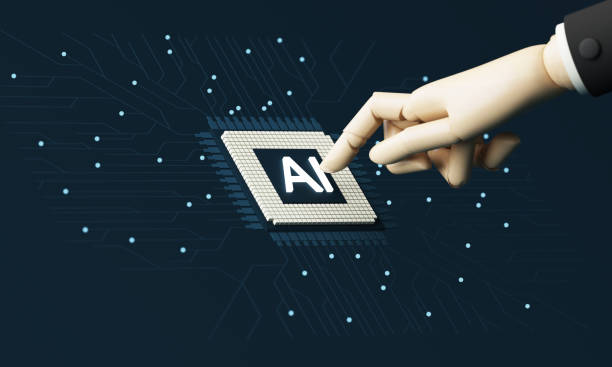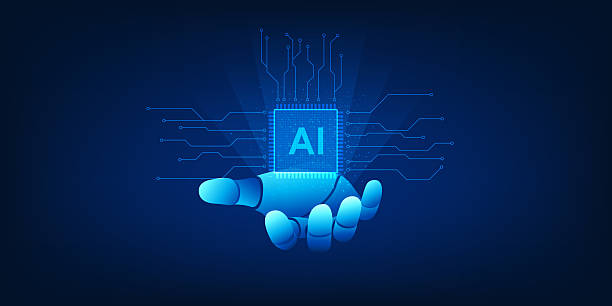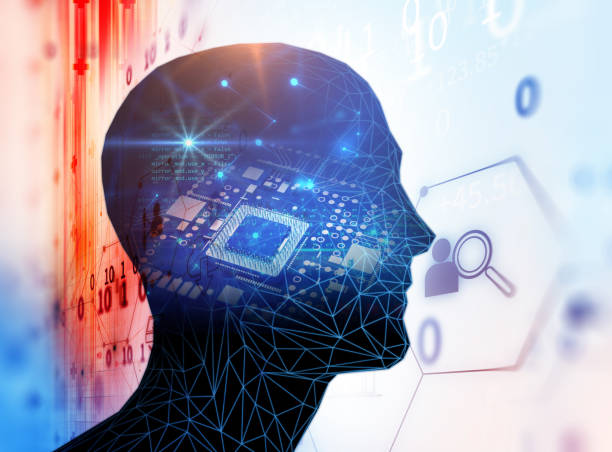What is Artificial Intelligence? Definition and Basic Concepts
#Artificial_Intelligence (AI) generally refers to the ability of a computer system to perform tasks that usually require human intelligence.
These tasks include learning, reasoning, problem-solving, language understanding, and pattern recognition.
Artificial intelligence is a broad and multidisciplinary field that benefits from computer science, mathematics, statistics, psychology, and cognitive science.
Simply put, artificial intelligence tries to enable machines to think, learn, and act.
Definition of Artificial Intelligence in Wikipedia
Key concepts in artificial intelligence include: Machine Learning, Deep Learning, Neural Networks, Natural Language Processing, and Computer Vision.
Machine learning allows machines to learn from data without being explicitly programmed.
Deep learning is a subset of machine learning that uses deep neural networks to analyze data.
Natural language processing allows machines to understand and generate human language.
Computer vision allows machines to understand and interpret images.
Artificial intelligence is advancing rapidly and has the potential to create fundamental transformations in many industries.
Artificial intelligence is currently used in many fields, including medicine, finance, transportation, education, and entertainment.
For example, in medicine, artificial intelligence can be used to diagnose diseases, develop new treatments, and improve patient care.
In finance, artificial intelligence can be used to detect fraud, manage risk, and provide personalized financial services.
In transportation, artificial intelligence can be used to develop self-driving cars, optimize traffic, and improve safety.
Does your current company website not reflect your brand’s credibility and power as it should? Resaweb solves this challenge for you with professional corporate website design.
✅ Increase the credibility and trust of visitors
✅ Attract more targeted customers
⚡ Click to receive free consultation!
Types of Artificial Intelligence #Weak, #Strong and #Superintelligent
Artificial intelligence can be divided into three main categories based on the level of ability and intelligence: Weak AI or Narrow AI, Strong AI or General AI, and Super AI.
Weak artificial intelligence refers to systems that are designed to perform a specific task and perform similarly to or better than humans in that same task.
Examples of weak artificial intelligence include: facial recognition systems, virtual assistants such as Siri and Alexa, and movie and music recommendation systems.
These systems can only operate in the limited area for which they were designed and do not have the ability to generalize to other tasks.
Strong artificial intelligence refers to systems that have the ability to understand, learn, and apply knowledge in a wide range of tasks, just like a human.
In other words, strong artificial intelligence can perform any task that a human can perform.
Strong artificial intelligence is still in the theoretical stage and no strong artificial intelligence system has been built so far.
Creating strong artificial intelligence is one of the main goals of many researchers and scientists in the field of artificial intelligence.
Super-intelligent artificial intelligence refers to systems that surpass human intelligence and are capable of solving problems that even the best human minds are unable to solve.
Super-intelligent artificial intelligence can have profound effects on society and the world, bringing with it many risks and opportunities.
Super-intelligent artificial intelligence, like strong artificial intelligence, is still in the theoretical stage and its creation involves many technical and ethical challenges.
Machine Learning and Deep Learning Differences and Applications
Machine learning and deep learning are two important subsets of artificial intelligence that play a key role in the development of intelligent systems.
Machine learning allows machines to learn from data without being explicitly programmed.
In other words, machines use different algorithms to identify patterns and relationships in data and use these patterns to make predictions or decisions.
Deep learning is a subset of machine learning that uses deep neural networks to analyze data.
Deep neural networks are made up of multiple layers of nodes (neurons) that are interconnected and can identify more complex patterns in data.
The main difference between machine learning and deep learning is in how features are extracted from data.
In traditional machine learning, engineers must manually extract important features from the data and provide them to the machine learning algorithm.
But in deep learning, deep neural networks can automatically extract features from data.
This makes deep learning more suitable for solving more complex problems with larger data volumes.
The applications of machine learning and deep learning are very wide and include the following:
- Image recognition and machine vision
- Natural language processing
- Voice recognition
- Data prediction and analysis
- Self-driving cars
- Medicine and health
In short, machine learning and deep learning are two powerful tools in the field of artificial intelligence that allow machines to learn from data and perform various tasks.
Deep learning is better suited for solving more complex problems due to its ability to automatically extract features.
| Feature | Machine Learning | Deep Learning |
|---|---|---|
| Need for Feature Extraction | Manual extraction required | Automatic extraction |
| Data Volume Required | Less | More |
| Model Complexity | Simpler | More complex |
| Applications | Simpler tasks | More complex tasks |
The Role of Artificial Intelligence in Medicine Diagnosis, Treatment and Prevention
Artificial intelligence is increasingly used in the field of medicine and has the potential to create major transformations in the diagnosis, treatment and prevention of diseases.
In the field of diagnosis, artificial intelligence can help doctors diagnose diseases more accurately and quickly by analyzing medical images (such as X-rays and MRI).
For example, artificial intelligence systems can detect cancer at an early stage, even before clinical symptoms appear.
In the field of treatment, artificial intelligence can be used to develop new and personalized treatments.
For example, artificial intelligence can prescribe drugs that are specifically effective for patients by analyzing their genetic data.
Also, artificial intelligence can help surgeons perform surgeries more accurately and reduce surgical risks in robotic surgeries.
In the field of prevention, artificial intelligence can predict the risk of developing various diseases by analyzing people’s health data and help people prevent diseases by changing their lifestyle.
For example, artificial intelligence can predict the risk of cardiovascular diseases by analyzing data related to people’s diet, physical activity, and medical history and provide them with recommendations to improve their health.
In short, artificial intelligence has the potential to significantly improve the field of medicine and can help doctors better diagnose patients, provide more effective treatments, and prevent diseases.
The use of artificial intelligence in medicine can lead to increased lifespan, improved quality of life, and reduced treatment costs.
Did you know that 94% of first impressions of a company are related to its website design?
Resaweb helps you create the best first impression by providing professional corporate website design services.
✅ Create a professional and reliable image of your brand
✅ Easier attraction of potential customers and improved online position
⚡ Get free corporate website design consultation
Artificial Intelligence and Self-Driving Cars Challenges and Opportunities
Artificial intelligence plays a key role in the development of Autonomous Vehicles.
Self-driving cars use artificial intelligence to understand their surroundings, make decisions, and control the car.
Artificial intelligence systems in self-driving cars use data from various sensors (such as cameras, lidar, and radar) to create a three-dimensional model of the surrounding environment.
Then, machine learning and deep learning algorithms are used to detect objects (such as pedestrians, other cars, and traffic signs), predict their behavior, and plan a route.
The development of self-driving cars brings with it many technical and ethical challenges.
One of the main challenges is ensuring the safety of self-driving cars.
Self-driving cars must be able to operate safely in various weather and traffic conditions and prevent accidents.
Also, ethical issues related to decision-making by self-driving cars in critical situations (such as when an accident is inevitable) should also be considered.
Despite the challenges, self-driving cars also bring many opportunities.
Self-driving cars can reduce traffic accidents, improve traffic flow, reduce fuel consumption, and increase access to transportation for people with disabilities and the elderly.
Also, self-driving cars can create new opportunities in various economic and social fields.
In short, artificial intelligence plays a vital role in the development of self-driving cars, and this technology has the potential to create major transformations in the transportation industry.
However, there are many technical and ethical challenges that must be solved before self-driving cars are widely used.
Artificial Intelligence in Business and Marketing Data Analysis, Automation and Customer Experience
Artificial intelligence is widely used in business and marketing and can help companies analyze data, automate processes, and improve customer experience.
In the field of data analysis, artificial intelligence can identify patterns and trends by analyzing huge amounts of customer data that are not visible to humans.
This information can help companies better understand their customers, anticipate their needs, and market their products and services more effectively.
In the field of process automation, artificial intelligence can automatically perform repetitive and time-consuming tasks.
For example, artificial intelligence can be used to answer customer questions, process orders, and generate reports.
Process automation can reduce costs, increase productivity, and improve service quality.
In the field of customer experience, artificial intelligence can improve customer experience by providing personalized services and intelligent interactions.
For example, artificial intelligence can be used to suggest related products and services to customers, provide online support, and create personalized marketing campaigns.
Improving customer experience can increase customer loyalty, increase sales, and improve brand reputation.
In short, artificial intelligence is a powerful tool for companies in the field of business and marketing and can help them better analyze data, automate processes, and improve customer experience.
The use of artificial intelligence in business and marketing can lead to increased profitability, growth and competitiveness of companies.
Artificial Intelligence and the Future of Work Job Displacement or New Opportunities?
One of the main concerns about artificial intelligence is its impact on the future of work.
Some people believe that artificial intelligence will replace many jobs and lead to widespread unemployment.
While others believe that artificial intelligence will create new opportunities for work and increase productivity and economic growth.
In reality, probably both scenarios will be somewhat true.
Artificial intelligence will probably replace some jobs, especially jobs that are repetitive, routine, and automatable.
However, artificial intelligence will also create new opportunities for work, especially jobs that require human skills such as creativity, problem-solving, critical thinking, and emotional intelligence.
Also, artificial intelligence can help people learn new skills and adapt to changes in the labor market.
In order to benefit from the advantages of artificial intelligence in the future of work and prevent its risks, it is necessary to adapt our education to the new needs, create appropriate support policies for the unemployed, and focus on the development of human skills.
Also, it is necessary to pay attention to ethical issues related to the use of artificial intelligence in the workplace and prevent discrimination and inequality.
| Impact | Jobs Affected | Example |
|---|---|---|
| Replacement | Repetitive and routine tasks | Production line workers, data entry |
| Reinforcement | Tasks that require human skills | Doctors, teachers, artists |
| Creation | New jobs in the field of artificial intelligence | Artificial intelligence engineers, data scientists |
Ethical Issues in Artificial Intelligence Privacy, Discrimination and Accountability
The development and use of artificial intelligence bring with them important ethical issues that should be considered.
One of these issues is protecting the privacy of individuals.
Artificial intelligence systems often require a large amount of personal data from individuals in order to perform well.
This data can include information about people’s health, finances, online behavior, and geographic location.
Protecting this data and preventing its misuse is of high importance.
Another issue is discrimination.
Artificial intelligence systems can unintentionally be discriminatory, especially if the data used to train them is discriminatory.
For example, a facial recognition system may perform worse at recognizing the faces of people with dark skin.
Preventing discrimination in artificial intelligence systems requires careful attention to data and algorithms.
The third issue is accountability.
If an artificial intelligence system causes damage, who is responsible? The developer, the user, or the artificial intelligence system itself? Determining responsibility in artificial intelligence systems is challenging and requires the creation of new laws and regulations.
In short, the development and use of artificial intelligence should be done with consideration of ethical issues to prevent misuse of this technology and to distribute its benefits fairly in society.
Protecting privacy, preventing discrimination, and determining accountability are among the important ethical issues that should be considered.
Are you disappointed with the low conversion rate of your online store?
Resaweb is your definitive solution with professional online store website design!
✅ Increase your sales and revenue
✅ Unique user experience for your customers
⚡ Get a free consultation now!
The Future of Artificial Intelligence Predictions and Key Trends
The future of artificial intelligence looks very bright and exciting.
It is predicted that artificial intelligence will increasingly penetrate our lives in the coming years and create major transformations in various fields.
Some of the key trends in the future of artificial intelligence include:
- Increasing computing power
- Development of new algorithms
- Access to more data
- Increased investment
- Development of new applications
With increasing computing power, artificial intelligence systems will be able to solve more complex problems and perform better.
The development of new algorithms will enable artificial intelligence systems to learn from data more effectively and make better decisions.
Access to more data will enable artificial intelligence systems to identify more accurate patterns and make better predictions.
Increased investment will accelerate research and development in the field of artificial intelligence.
The development of new applications will allow artificial intelligence to be used in various fields such as medicine, transportation, education, manufacturing, and entertainment.
In general, the future of artificial intelligence is full of opportunities and challenges.
In order to benefit from the advantages of artificial intelligence and prevent its risks, it is necessary to actively participate in the development and use of this technology and pay attention to the ethical issues related to it.
How to Learn Artificial Intelligence Resources and Guidance
If you are interested in learning artificial intelligence, many resources and guidance are available to you.
One of the best ways to start is to participate in online or in-person courses.
Many courses in the field of artificial intelligence are offered on sites such as Coursera, edX, and Udacity.
Also, there are many books and articles about artificial intelligence that you can use.
In addition, you can strengthen your skills in the field of artificial intelligence by participating in practical projects.
There are many projects on sites like GitHub that you can participate in.
Also, you can create your own personal projects and implement them using various artificial intelligence tools and libraries.
To learn artificial intelligence, it is necessary to have basic knowledge in the fields of mathematics, statistics, and programming.
If you do not have this knowledge, you can start by learning these topics.
Also, it is necessary to have patience and perseverance and to continue learning and practicing continuously.
In short, learning artificial intelligence requires effort and perseverance, but by using appropriate resources and guidance, you can become an artificial intelligence expert and work in this field.
Online Artificial Intelligence Resources
Frequently Asked Questions
| Question | Answer |
|---|---|
| What is the definition of Artificial Intelligence (AI)? | It is a field in computer science that aims to create intelligent machines that can think, learn, solve problems, and make decisions like humans. |
| Mention some common applications of Artificial Intelligence. | These include self-driving cars, voice assistants (such as Siri and Alexa), recommendation systems (such as Netflix and Amazon), facial recognition, and medical diagnosis. |
| What is the difference between Narrow Artificial Intelligence (ANI) and General Artificial Intelligence (AGI)? | Narrow Artificial Intelligence specializes in one specific task, while General Artificial Intelligence possesses a human intellectual ability to perform any cognitive task. |
| What is Machine Learning and its relationship to Artificial Intelligence? | Machine Learning is a branch of Artificial Intelligence that focuses on developing algorithms that allow systems to learn from data without explicit programming. |
| What are Artificial Neural Networks? | They are computational models inspired by the structure and function of the human brain, and are used in deep learning to process data and discover complex patterns. |
| Mention some ethical challenges related to Artificial Intelligence. | These include issues of privacy, bias in data and algorithms, job loss, and accountability in the event of errors or unfair decisions. |
| What is Natural Language Processing (NLP)? | It is a branch of Artificial Intelligence that focuses on enabling computers to understand, interpret, and generate human language in a useful and interactive way. |
| How can Artificial Intelligence affect the labor market? | It can lead to the automation of some routine tasks, requiring retraining of workers and creating new jobs in the areas of designing, developing, and maintaining Artificial Intelligence systems. |
| What is Computer Vision? | It is a field in Artificial Intelligence that enables computers to “see,” understand, and interpret images and videos in the same way that humans do, allowing them to recognize objects and faces. |
| What is the importance of data in developing Artificial Intelligence systems? | Data is the fuel that powers Artificial Intelligence systems, especially in machine learning. The quality and quantity of data greatly affect the accuracy and performance of models and their ability to learn and make the right decisions. |
And other services of Rasa Web Advertising Agency in the field of advertising
Intelligent Digital Advertising: A creative platform to improve click-through rate with precise audience targeting.
Intelligent Conversion Rate Optimization: A combination of creativity and technology to increase website visits by designing an attractive user interface.
Intelligent Conversion Rate Optimization: Designed for businesses looking to grow online through the use of real data.
Intelligent Direct Marketing: A combination of creativity and technology to attract customers through a SEO-focused content strategy.
Intelligent Marketplace: A combination of creativity and technology to interact with users by optimizing key pages.
And more than hundreds of other services in the field of internet advertising, advertising consulting, and organizational solutions
Internet Advertising | Advertising Strategy | Advertorial
Resources
Application of artificial intelligence in the future
,Introductory training in artificial intelligence
,What is Artificial Intelligence
,Everything about artificial intelligence
? Are you ready to transform your business in the digital world? Rasa Web Digital Marketing Agency, with expertise in designing websites with a modern user interface, SEO, and content marketing strategies, paves your path to online success.
📍 Tehran, Mirdamad Street, next to the Central Bank, South Kazerun Alley, Ramin Alley No. 6













